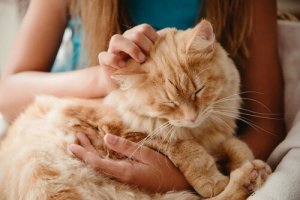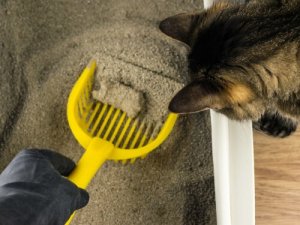How Does Old Age Affect Your Cat's Behavior?


Written and verified by the biologist Ana Díaz Maqueda
Like all animals, cats grow up and, as they get older, their behavior starts to change. These changes don’t necessarily lead to serious behavioral problems. In the majority of cases, they’re completely normal, and are no cause for concern. However, it’s important for owners to try to understand how old age can affect their cat’s behavior.
The arrival of old age is much more subtle in cats than it is in dogs. In fact, experts still can’t agree on when a cat should be considered physiologically old. As a result, all cats older than 11 years old should be considered senior.
When it comes to making changes to your pet’s diet or their veterinary care, it’s important to pay attention to their age, rather than their appearance or behavior. For example, a 12-year-old cat may still be healthy and active, but it should still be treated as a senior.
Cognitive dysfunction syndrome in cats
Cognitive dysfunction syndrome isn’t the same as normal aging. An older cat may display notable changes in its behavior, but that doesn’t necessarily mean that those changes are caused by this syndrome. Cognitive dysfunction causes distinct anatomical and physiological changes in the brain, similar to those seen in humans suffering from Alzheimer’s disease.

Many of the behavioral changes brought on by old age are similar to those seen in cats with cognitive dysfunction syndrome, including:
- Disorientation
- Changes in their interactions with owners and other pets
- Changes in their sleep patterns
- Urinating or defecating on the floor
- Changes in their activity levels (either an increase or decrease)
Common behavior in older cats
Behavioral problems in senior cats may be the result of normal deterioration that occurs as the animal gets older. For example, a cat that urinates on the floor could be suffering from joint pain caused by arthritis, which may be preventing it from climbing in and out of the litter tray.

The appearance of aggressive behavior in cats can be a sign of discomfort, such as dental issues or a hormonal imbalance. If your cat appears anxious, it may be due to chronic renal disease, a condition common in older cats.
These behavioral changes can be early a warning sign that something’s not quite right with your pet, and can help your vet to detect an underlying illness early on.
According to a number of studies, older cats commonly display behavior such as:
- Urinating or defecating outside the litter box
- Aggression toward other cats in the house
- Aggression toward people
- Excessive vocalization
- Anxiety
- Excessive grooming
- Disorientation
- Irritability
- Fear
- Increased attachment to their owners
Old age: how to take care of a senior cat
There are several ways you can minimize changes in your cat’s behavior, and help make their final years happy and comfortable. Firstly, you’ll need to book a veterinary check-up to rule out any potential health issues.
You may also want to adapt your home to make it more suitable for your senior cat. For example, if they have trouble getting into the litter box, try to find one with lower sides so that it’s easier for them to get in and out.
Similarly, if your cat is used to sleeping on the couch or bed, you could buy a small stool or ramp to allow them to get up and down. As your cat gets older, it’s best to avoid making big changes to their environment, as they can easily get disoriented. Make sure to keep the food and water bowls in their regular place, so that they know where to find them.
While they may be old, it’s important for senior cats to stay active. If they mainly eat a diet of kibble, be sure to choose one designed for older pets. Alternatively, if your cat likes wet food, this is the ideal time to increase their amount of wet food and decrease the amount of kibble in their diet. This is better for their kidneys, as long as you choose a good-quality brand, of course.
All cited sources were thoroughly reviewed by our team to ensure their quality, reliability, currency, and validity. The bibliography of this article was considered reliable and of academic or scientific accuracy.
- Gunn-Moore, D. A. (2011). Cognitive dysfunction in cats: clinical assessment and management. Topics in companion animal medicine, 26(1), 17-24.
- Karagiannis, C., & Mills, D. (2014). Feline cognitive dysfunction syndrome. Veterinary Focus, 24(2), 42-7.
- Landsberg, G. M., Denenberg, S., & Araujo, J. A. (2010). Cognitive dysfunction in cats: a syndrome we used to dismiss as ‘old age’. Journal of feline medicine and surgery, 12(11), 837-848.
- Landsberg, G. M., Nichol, J., & Araujo, J. A. (2012). Cognitive dysfunction syndrome: a disease of canine and feline brain aging. Veterinary Clinics: Small Animal Practice, 42(4), 749-768.
This text is provided for informational purposes only and does not replace consultation with a professional. If in doubt, consult your specialist.